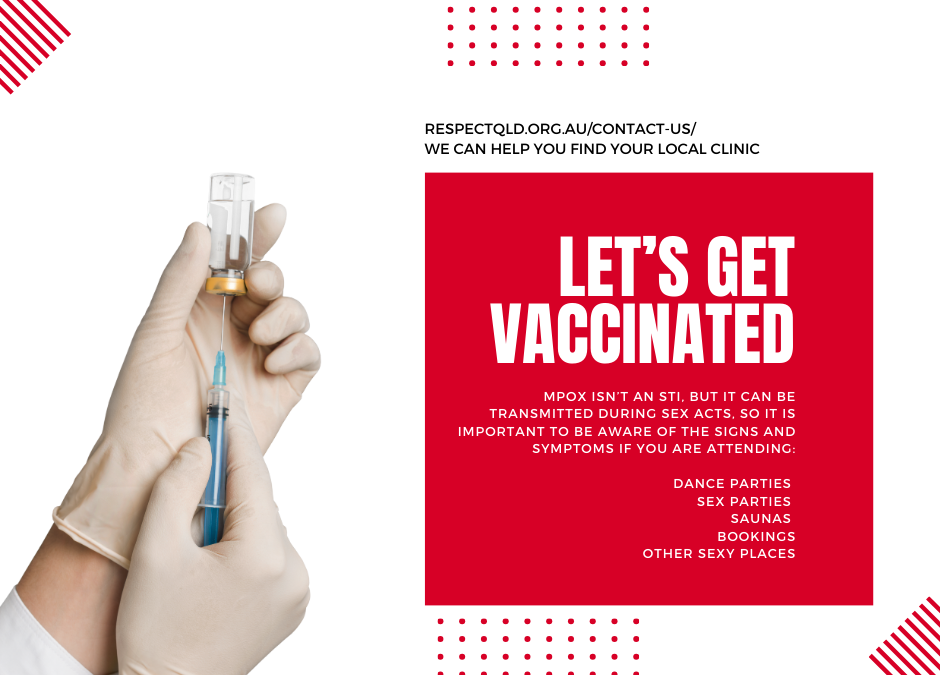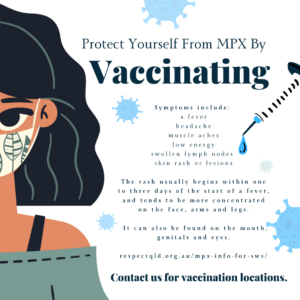,What is Mpox?
Mpox (Formerly referred to as MonkeyPox) is a viral infection that is rare and does not spread easily between people. Mpox is typically associated with travel to Central or West Africa, where it is endemic.
However, in 2022, several non-endemic countries, including Australia, several European countries, and the United States, reported cases of Mpox. In Queensland, limited cases were also observed, raising concerns of potential community transmission.
Mpox usually begins with flu-like symptoms and swelling of the lymph nodes, followed by a widespread rash on the face and body. While Mpox is usually self-limited and resolves within 2 to 4 weeks, severe cases can occur.
How do people get Mpox?
Transmission of Mpox occurs through skin-to-skin contact with blisters, sores, scabs, or bodily fluids from someone with the virus. Although Mpox is not commonly considered a sexually transmitted infection, it can be transmitted during sexual activities. Mpox can be easily spread during activities that involve close personal contact, including sexual contact, cuddling, and others. Breaks in the skin or mucous membranes in the mouth, anus, or genitals are potential entry points for the virus.
Additionally, touching materials or objects that someone with the virus has come into contact with, such as clothing, towels or bed sheets, may also be a possible route of transmission, but its frequency is unclear.
Mpox can be transmitted from the onset of symptoms until the skin has fully healed.
Sex work activities that may increase the risk of Mpox transmission include oral, anal, and vaginal sex or any activity that involves skin-to-skin contact with Mpox blisters, sores, scabs, or the genitals or anus of someone with the virus. Hugging, massage, body slides and kissing that involve skin-to-skin contact also pose a higher risk. Prolonged face-to-face contact and touching fabrics or objects that have not been disinfected, such as bedding, towels, fetish gear, and sex toys, are considered lower risk.
It is recommended to monitor for symptoms and get vaccinated as early as possible if you do choose to be vaccinated.
What are the symptoms of Mpox?
Early stages of Mpox can cause a general feeling of being unwell, making it difficult to distinguish from other illnesses such as COVID, Flu, and some STIs. Symptoms to watch out for include fever, sore throat, back pain, headache, fatigue, and pain on urination or rectal pain, discharge or bleeding. However, some people may not experience any symptoms during this stage.
The Mpox rash consists of small, round spots that may look like pimples, or larger blisters or ulcers. It can appear on any part of the body, but some people will only get it on their genitals, anus, and/or mouth. Sometimes the rash appears on the hands, feet, eyes, face, arms, chest, and legs. It may appear one to two days before or three to four days after the general feeling of sickness described earlier. Some people may only experience the rash without feeling sick. The rash typically lasts for two to three weeks, after which it develops into sores that crust over and fall off.
How do I prevent Mpox?
If you have Mpox, it is important to avoid sexual contact as much as possible until symptoms have resolved. If you have had contact with someone with a confirmed case of Mpox, avoid physical contact as much as possible for 21 days and monitor for symptoms. Always practise good hand hygiene. Regularly wash hands for 20 seconds with soap and running water or alcohol-based hand sanitiser.
Some things sex workers can do to reduce the risk of MPX transmission
- Extend health checks on clients to check areas like the mouth, face, palms of hands, and soles of feet for lesions or blisters. Gloves are recommended for these checks.
- Wash your hands after the check.
- If in doubt after a health check, you can refuse service or offer an alternative service such as hand relief or mutual masturbation using gloves.
- Condoms, gloves and/or dental dams may be used as barriers. Remember that barriers will only protect the skin covered.
- Cover toys with condoms, and wash and re-cover before using again.
- Wear gloves when handling soiled bedding, towels or clothing.
Tips if you can’t avoid sexual/physical contact
- Offer alternative services such as mutual masturbation without touching each other and without touching any rash or sores. Keeping fluids out of contact from each other.
- Condoms, gloves and/or dental dams may be used when engaging in sexual activity. Remember that barriers will only protect the skin that they cover.
- Avoid kissing and swapping of any fluids.
- Wash your hands, sex toys and furniture, and any fabrics (bedding, towels, clothing) after having sex. Use gloves when handling these items.
- Where possible, limit the number of clients you see to avoid opportunities for further infection.
Can I be vaccinated against Mpox?
Yes. The eligibility criteria for the Mpox vaccine in Queensland has been expanded to include sex workers. Those eligible to receive the Mpox vaccine at no cost include sexually active men who have sex with men, including trans individuals, and their sexual partners, as well as sex workers.
If you believe you have been exposed to Mpox, getting vaccinated within 4 days of first exposure (known as post-exposure prophylaxis) provides the highest chance of avoiding the disease. Vaccination between 4 – 14 days of exposure is likely to lessen the severity of the disease.
Additional information about the Mpox vaccine can be found on the Australian Government Department of Health website https://www.health.gov.au/diseases/mpox-monkeypox/vaccines , and the JYNNEOS vaccine is available at various Mpox Vaccination Centres. To find the nearest vaccination centre, you can use the clinic finder map https://www.health.qld.gov.au/clinical-practice/guidelines-procedures/diseases-infection/immunisation/monkeypox-vaccination-centres.
Sex workers can contact Respect Inc to find a vaccination clinic that is more likely to be sex worker-friendly, to avoid the risk of experiencing discrimination, or if sex workers don’t want to disclose our sex worker status to GPs.
It’s important to ask your vaccination provider about any consultation fees that may apply if you receive the vaccine at a GP clinic.
For optimal protection against Mpox, it is necessary to receive two doses of the vaccine, with a minimum gap of 28 days between them. The vaccine provides maximum effectiveness two weeks after the second dose and offers an 80% safeguard against Mpox.
How is Mpox treated?
For the majority of cases, Mpox is a mild illness that can be managed at home by getting plenty of rest, staying hydrated, and taking over-the-counter pain and fever medications like paracetamol or ibuprofen. However, in more severe cases, it is important to seek medical attention. If you are experiencing severe symptoms, it is recommended to consult with your GP or a sexual health service for proper treatment and care. Please contact Respect Inc if you would like help finding a sex worker-friendly doctor.
Follow this link for more information on Mpox from the Queensland Health resource:
https://www.qld.gov.au/health/
All Information is from
https://www.health.gov.au/resources/publications/atagi-clinical-guidance-on-vaccination-against-monkeypox
https://www.qpp.org.au/mpxv/
https://redbook.scarletalliance.org.au/mpx/






